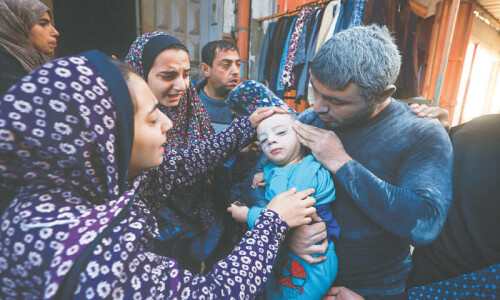• Over 700 killed since end of truce on Friday; at least 160 dead after residential blocks bombed
• WHO chief ‘lost for words’ to describe horrors being witnessed in overstretched hospitals
GAZA: Israeli forces overran nearly all parts of the Gaza Strip on Sunday, as more than 700 Palestinians were reported to have been killed after Tel Aviv ended a week-long truce.
A statement from Israeli Chief of General Staff Herzi Halevi said that his forces were operating across north and south Gaza, with tanks and soldiers seen moving through the besieged territory over the weekend.
The death toll from Israel’s relentless bombing has climbed above 15,500, including 280 medical staff, in more than eight weeks of Israeli aggression.
United Nations High Commissioner for Human Rights Volker Turk voiced alarm that hundreds of thousands of Gazans “are being confined into ever smaller areas” in the southern of the territory.
“There is no safe place in Gaza,” he said.
UN-OCHA said at least 160 Palestinian deaths were reported in two incidents in northern Gaza on Saturday: the bombing of a six-storey building in Jabalia refugee camp, and of an entire block in Gaza City.
In a new estimate, OCHA said around 1.8 million people in Gaza, roughly 75 per cent of the population, had been displaced, many to overcrowded and unsanitary shelters.
Jumana Murad said her son Mohammad, 19, was killed as he tried to help women and children out of a tent inside a school.
“A piece of shrapnel hit him in the head,” she told AFP before bursting into tears.
Nasser hospital in the southern Gaza city of Khan Yunis overflowed with both the wounded and the dead.
Hospitals in the southern Gaza Strip have descended into chaos since the resumption of hostilities, and WHO chief Tedros Adhanom Ghebreyesus said that some patients there were being treated on the floor, in conditions “unimaginable for the provision of health care”.
He said he was unable to “find words strong enough” to express his concerns about the conditions there.
Members of a WHO team who visited the hospital, found it packed with 1,000 patients, three times its capacity.
Patients were being treated on the floor “screaming in pain”, with “countless people… seeking shelter, filling every corner”, the WHO chief wrote. Gazans are short of food, water and other essentials, and the aid reaching them is “a drop in the ocean of needs,” said Adnan Abu Hasna, a spokesman for the UN agency for Palestinian refugees, UNRWA.
On Sunday, Israeli air and artillery strikes hit Gaza’s northern frontier, throwing thick clouds of smoke and dust into the sky.
The Israeli military also claimed it had located more than 800 shafts to Hamas tunnels and “destroyed” about 500 of them, adding that many were near or inside civilian buildings such as schools and mosques.
Separately, fighting also flared on Israel’s northern border with Lebanon. The Israeli army said it had launched artillery strikes in response to cross-border fire, and its fighter jets hit a number of targets linked to Hezbollah.
Hamas, meanwhile, said its fighters clashed with Israeli troops about 2km from the southern city of Khan Yunis, as residents said they feared a fresh Israeli ground offensive was building there.
The Jabalia refugee camp in the north of the Hamas-ruled enclave was among the sites hit reported hit from the air. A Gazan health ministry spokesperson said several people were killed by an Israeli air strike.
The Israeli military ordered Palestinians to evacuate several areas in and around Khan Younis. It posted a map highlighting shelters they should go to west of Khan Yunis and south towards Rafah, on the border with Egypt.
But residents said that areas they had been told to go to were themselves coming under attack.
“I am a resident of Gaza City, then we moved to Al-Karara in southern Gaza Strip and yesterday we fled to deeper shelter in Khan Yunis and today we are trying to flee under the bombardment to Rafah,” he said.
Published in Dawn, December 4th, 2023















































Dear visitor, the comments section is undergoing an overhaul and will return soon.